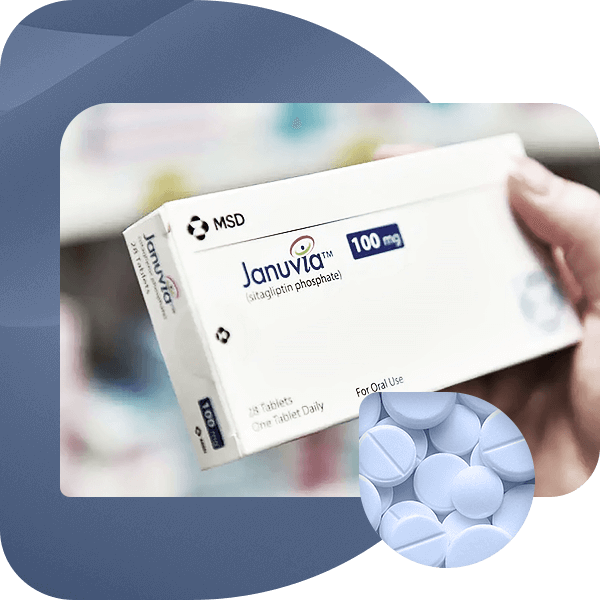The Science Behind Januvia: How It Controls Blood Sugar.
Unveiling Januvia: a Revolutionary Blood Sugar Regulator
In the landscape of diabetes management, the introduction of Januvia marks a significant breakthrough, catapulting the approach towards blood sugar regulation into a new era. Sitagliptin, commercially known as Januvia, belongs to a class of medications that has revolutionized the management of Type 2 diabetes by offering a unique mechanism to control blood glucose levels effectively. This innovative drug works by selectively inhibiting the dipeptidyl peptidase-4 (DPP-4) enzyme. The inhibition of DPP-4 plays a crucial role in blood sugar regulation, as it prolongs the activity of incretin hormones, which are integral to the glucose-mediated insulin release and the reduction of glucagon secretion in the liver.

The synergy between Januvia and the body's natural physiological mechanisms underscores its revolutionary impact. By amplifying the effects of incretin hormones, it facilitates a more controlled and physiological approach to managing blood sugar levels, emulating the body's innate response to glucose intake. This mechanism ensures that the insulin release stimulated by Januvia is always glucose-dependent, thereby significantly mitigating the risk of hypoglycemia, a common concern with other diabetes medications.
| Feature | Description |
|---|---|
| Mechanism of Action | Inhibits DPP-4 enzyme, prolongs incretin hormone activity |
| Benefit | Enhances glucose-mediated insulin release |
| Risk Mitigation | Reduces likelihood of hypoglycemia |
| Drug Class | DPP-4 inhibitor (Januvia) |
Through its innovative science, Januvia harmonizes with the body's glucose regulation processes, establishing a new standard for managing Type 2 diabetes. Its ability to tune into the body's own regulatory systems not only amplifies its efficacy but also enhances the safety profile of blood sugar management therapies. As research continues to unfold, Januvia's role in transforming diabetes care becomes increasingly paramount, embodying a blend of efficacy and safety that reassures both patients and healthcare providers alike.
The Intriguing Mechanism of Action: Science Speaks
Januvia operates at the molecular level to mitigate the challenges posed by type 2 diabetes. Its efficacy is rooted in its ability to dynamically intervene in the body's natural processes, specifically focusing on the regulation of the incretin system, which plays a critical role in glucose metabolism. Incretins are hormones that are released after eating and they significantly augment insulin secretion from the pancreas in a glucose-dependent manner. However, in individuals with type 2 diabetes, the incretin system functions suboptimally, leading to impaired insulin secretion and hyperglycemia. Januvia, as a selective dipeptidyl peptidase-4 (DPP-4) inhibitor, prevents the breakdown of incretin hormones, thereby enhancing their activity. This modulation ensures a more regulated insulin release and lowers blood glucose levels effectively.
The elegance of Januvia's mechanism lies in its targeted approach, which minimizes the risk of hypoglycemia—a common pitfall of many diabetes treatments. By operating in a glucose-dependent manner, it amplifies the body’s own response to rising blood sugar levels without pushing them below normal thresholds. This nuanced intervention exemplifies the advances in pharmaceutical sciences, where the goal is not only to mitigate symptoms but to harmonize treatment with the body's natural rhythms and processes.

Moreover, Januvia's role extends beyond mere insulin regulation. Research shows it may also have a protective effect on pancreatic beta cells, the cells responsible for insulin production, suggesting a potential to alter the disease course by preserving beta-cell function. This dual action, both controlling glucose levels and possibly preserving pancreatic function, positions Januvia as a pivotal tool in the management of type 2 diabetes.
Lastly, the clinical application of Januvia underscores a significant leap in the understanding and treatment of diabetes. Through its targeted mechanism, it offers a promising route to manage a complex condition, emphasizing the importance of continual innovation in medical science. As we venture deeper into the genetics and biochemistry of diabetes, drugs like Januvia set the stage for more personalized and effective interventions, showcasing the power of science in transforming patient care and outcomes.
Dpp-4 Inhibitors: Pioneers in Glycemic Control
At the heart of innovative diabetes management lies the utilization of dipeptidyl peptidase-4 (DPP-4) inhibitors, a class of medications that have significantly advanced the approach to glycemic control. These inhibitors operate on a fascinating biochemical principle, targeting the DPP-4 enzyme responsible for breaking down incretin hormones GLP-1 and GIP. These hormones play a pivotal role in the regulation of blood glucose levels, primarily by stimulating the pancreas to produce insulin in a glucose-dependent manner. Thus, by inhibiting DPP-4, these medications prolong the action of incretin hormones, enhancing the body's natural ability to manage postprandial hyperglycemia without predisposing patients to undue hypoglycemic events.
Januvia, known generically as sitagliptin, stands out within this pharmaceutical class by offering a precise balance between efficacy and patient safety. Through its selective inhibition of the DPP-4 enzyme, Januvia effectively amplifies the body's insulin release in response to elevated blood glucose levels while simultaneously suppressing the release of glucagon. This double-barreled mechanism ensures a reduction in hepatic glucose production, thereby facilitating a smoother regulation of glucose levels throughout the day. Moreover, this medication's glucose-dependent mode of action embodies a harmonious relationship with the body's existing physiological processes, minimizing the risk of weight gain and significantly reducing fears of hypoglycemia, a common concern in diabetes management.

The therapeutic benefits of Januvia extend beyond mere glycemic stabilization, heralding a new era in the treatment of type 2 diabetes. Clinical trials and real-world studies have consistently demonstrated its efficacy in improving glycemic control, as evidenced by significant reductions in hemoglobin A1c levels. Additionally, its favorable safety profile, coupled with the convenience of once-daily dosing, underscores its value in the diabetes therapeutic landscape. In essence, DPP-4 inhibitors like Januvia not only transform our understanding of diabetes management but also empower patients to achieve better health outcomes with minimal adverse effects, marking a significant milestone in the journey towards comprehensive disease control.
Januvia and Your Body: a Harmonious Relationship
Januvia operates within an intricately balanced ecosystem of the human body, primarily focusing on the enhancement of the natural processes central to glycemic control. By augmenting the function of incretin hormones, Januvia facilitates an increase in the production of insulin when glucose levels rise, while simultaneously suppressing the liver's glucose production. This dual action mirrors the body's physiological response to meals, allowing for a more nuanced approach to managing blood sugar levels, thereby fostering a more naturalistic integration into the body's existing regulatory mechanisms.
The science encapsulating Januvia's interaction with the body's systems is profound. Incretin hormones, released by the intestine throughout the day and in increased quantities after meals, play a pivotal role in the regulation of blood sugar. Januvia's mechanism of action involves inhibiting the enzyme DPP-4, which is responsible for the degradation of incretin hormones. By doing so, it prolongs the action of these hormones, thus enhancing the body's ability to control glucose levels efficiently without the undue stress of severe fluctuations. This process not only demonstrates Januvia's harmonious relationship with the body's existing metabolic processes but also underscores its utility in providing a stabilizing effect on blood sugar levels, mitigating the risks associated with erratic glycemic control.
Moreover, the relationship between Januvia and the body extends beyond mere biochemical interactions. The drug's efficacy is tailored to work in synchrony with the body's daily rhythms. Its once-a-day dosing regimen is designed to complement the natural cycle of metabolic activities, ensuring that its therapeutic action is both consistent and congruent with the body's internal clock. This consideration magnifies the effectiveness of Januvia, as it aligns pharmacological intervention with physiological dynamics, enhancing patient compliance and overall satisfaction with the treatment.
In the broad tapestry of diabetes management, Januvia heralds a paradigm steeped in the understanding of the body's intricate biological networks. Its action, rooted deeply in the principles of endocrinology and pharmacology, exemplifies a perfect amalgamation of science and nature, where the drug not only acts upon the body but does so by embracing and enhancing its natural functions. This harmonious relationship stands as a testament to the strides made in diabetes care, showcasing Januvia as not just a mere agent of glycemic control, but a catalyst for a more intuitive, body-centric approach to managing chronic conditions.
Real-life Benefits: Beyond Blood Sugar Stabilization
Januvia's impact extends well beyond the realm of glycemic control, offering a spectrum of benefits that enrich the lives of individuals managing Type 2 diabetes. By mitigating the fluctuations in blood glucose levels, this medication contributes to a reduction in the risk of diabetes-related complications, such as neuropathy, retinopathy, and cardiovascular diseases, which can be debilitating or even life-threatening over time. The stabilization of blood sugar levels also enhances the energy metabolism, leading to improved energy levels and overall vitality. This uptick in energy can significantly improve the quality of life, facilitating more active lifestyles and promoting better mental health outcomes, including reduced risks of depression and anxiety that are often associated with chronic conditions.
Moreover, Januvia's efficacy in managing blood sugar levels without causing significant weight gain stands as a notable advantage. Weight management is a critical component in the treatment of Type 2 diabetes, and medications that do not exacerbate this challenge are highly valued. Januvia operates through a mechanism that encourages glycemic control without the side effect of weight gain, distinguishing it from other antidiabetic agents. This feature is particularly beneficial for patients who struggle with obesity or are working towards weight loss as part of their diabetes management plan.
| Benefit | Description |
|---|---|
| Reduced Risk of Diabetes-Related Complications | Januvia lowers the chances of developing serious health issues such as neuropathy and cardiovascular disease. |
| Enhanced Energy and Vitality | Stabilizing blood sugar levels contributes to improved energy metabolism, leading to better overall health and well-being. |
| Weight Management Support | The unique action of Januvia manages glucose levels without contributing to weight gain, aiding in patient weight management goals. |
Through these multifaceted benefits, Januvia not only serves as a cornerstone in glycemic control but also significantly enhances the overall management of Type 2 diabetes, portraying an integrated approach to treatment that covers physical, mental, and lifestyle aspects of the disease.
Addressing the Safety Profile: Efficacy Meets Assurance
Januvia, scientifically known as sitagliptin, has emerged as a groundbreaking option in the management of Type 2 diabetes, primarily through modulating the incretin system, which plays a pivotal role in glucose homeostasis. However, its therapeutic benefits extend beyond efficacious glycemic control, warranting a thorough examination of its safety profile to provide a comprehensive assurance to healthcare professionals and patients alike. Rigorous clinical trials and post-marketing surveillance have meticulously documented the adverse effects associated with sitagliptin, presenting a safety profile that underscores its favorable risk-benefit ratio. Notably, sitagliptin has been associated with a low incidence of hypoglycemia, distinguishing it from other antidiabetic agents that often require stringent monitoring of blood glucose levels to mitigate this risk.
The synthesis of clinical data reveals that sitagliptin maintains a commendable tolerance in patients, with the most common adverse events being mild to moderate in nature and typically including nasopharyngitis, headache, and upper respiratory tract infections. Furthermore, sitagliptin's impact on pancreatic health, a subject of intensive investigation, has been closely scrutinized. Meta-analyses and long-term studies have provided reassuring evidence, affirming that its use does not significantly increase the risk of pancreatitis or pancreatic cancer, concerns that had previously clouded the therapeutic landscape of incretin-based therapies.
It is imperative to highlight that the integration of sitagliptin into a patient's diabetes management plan should be predicated on a holistic evaluation of the individual's health status. Special consideration should be given to populations with renal impairment, where dose adjustment is recommended to ensure optimal therapeutic outcomes without compromising safety. Additionally, ongoing monitoring and pharmacovigilance play a quintessential role in identifying and mitigating any unforeseen adverse effects, thereby ensuring that sitagliptin continues to exhibit a robust safety framework conducive to long-term use.
In conclusion, the journey of Januvia from clinical development to becoming a mainstay in diabetes care exemplifies the critical balance between efficacy and safety in drug therapy. Armed with a solid foundation of scientific evidence and bolstered by continuous monitoring, Januvia stands as a testament to the advancements in personalized medicine, offering individuals with Type 2 diabetes a reliable ally in their quest for glycemic stability, while upholding an unwavering commitment to safety.














